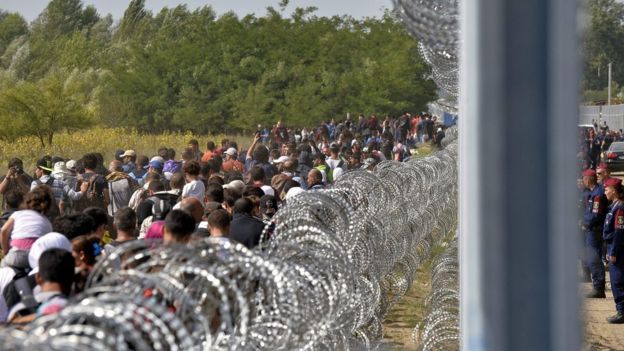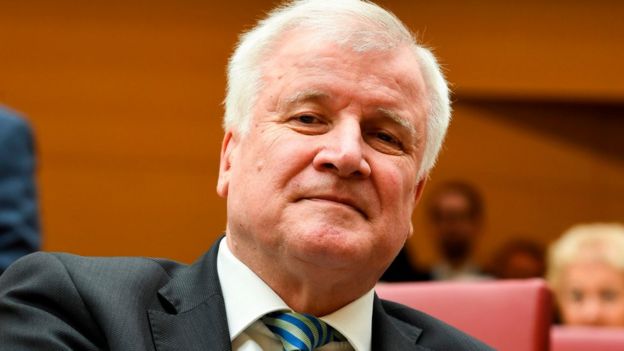Viktor Orban victory in Hungary: German minister warns EU
A key German minister says the EU must drop its "arrogance and condescension" towards Hungary, where Eurosceptic PM Viktor Orban has just won re-election.
Interior Minister Horst Seehofer wants curbs on Muslim migration to the EU, and Mr Orban sees himself as a defender of "Christian" Europe.
It is a tense time in EU-Hungary relations, as Mr Orban is defying EU migration and rule-of-law policies.
Election monitors said the vote was marred by media bias and xenophobia.
Observers from Europe's OSCE security organisation said "voters had a wide range of political options, but intimidating and xenophobic rhetoric, media bias and opaque campaign financing constricted the space for genuine political debate".
The vote took place in an "adverse climate" and political rivals could not compete with Mr Orban on an equal basis, the OSCE said.
Mr Orban, 54, campaigned on a Eurosceptic, anti-immigration platform. His Fidesz party won a two-thirds majority in parliament, as it did in two previous elections.
Anti-EU politicians, including France's Marine Le Pen, welcomed his win.
'Path of reform'
Polish PM Mateusz Morawiecki also congratulated Mr Orban, saying "the path of reform is never easy", but "the support of the majority of society shows that it is worth making this effort".
Poland's nationalist government shares Mr Orban's view that Muslim migrants threaten Europe's "Christian" heritage.
Poland, along with Slovakia and the Czech Republic, refuse to take in Eritrean and Syrian refugees who are currently living in overcrowded camps in Italy and Greece, awaiting relocation under an EU quota scheme.
Mr Orban was also congratulated by the centre-right European People's Party (EPP), the biggest bloc in the European Parliament. Fidesz is a member of that group, despite the policy disputes.
The parliament's liberal leader Guy Verhofstadt tweeted that "by congratulating Orban without calling on him to respect European values, the EPP legitimises his vile campaign, his attack on the rule of law & attempt to install authoritarianism".

Last month, Mr Seehofer spoke out against Chancellor Angela Merkel's liberal migration policy, saying "Islam does not belong" to Germany. His language echoed that of the far-right Alternative for Germany (AfD).
He also wants migrants to be kept in so-called "anchor centres" for up to 18 months while their asylum requests are processed.
But Mr Seehofer's Bavarian CSU party remains a vital ally of Mrs Merkel's Christian Democrats.
The migrant crisis of 2015-2016 saw more than a million migrants - many of them refugees from the wars in Iraq, Syria and Afghanistan - reach Germany.
Mrs Merkel's "we can manage" response riled many conservative Germans, but others reached out to help the asylum seekers.

How did the result play out?
Voter turnout reached a near-record 69%.
With almost all votes counted, the nationalist Jobbik party is in second place with 20%. The Socialists are in third with 12%, and the LMP, Hungary's main Green Party, is in fourth with 7%.
The leaders of the second and third-placed parties have resigned.

Orban keeps the provinces but loses the youth vote
By the BBC's Budapest Correspondent Nick Thorpe
As Fidesz paints the map of Hungary orange (its colour) once again, preliminary results show it will reach the 133 seats in the 199 seat parliament needed for a constitutional two-thirds majority. It won two-thirds victories at both previous elections, in 2010 and 2014.
The prime minister's party won in most rural constituencies and in provincial towns, while opposition parties took most seats in the capital, Budapest.
Mr Orban's legitimacy on a European level will probably be strengthened, as nationalist parties across the continent take heart from his victory.
Fidesz did lose a large part of the youth vote. The next government can be expected to include younger ministers in an attempt to address this problem.
The result spells trouble ahead for civil society groups which campaign for human rights and against corruption, and for critical media. Viktor Orban has promised a "settling of accounts - moral, politically, and legally" with his opponents.

What are Orban's policies?
The election campaign was dominated by immigration, with Mr Orban promising to defend the country's borders and block migration by Muslims.
In 2015, Hungary built a fence along its borders with Serbia and Croatia to stop illegal migrants.
Mr Orban refused to debate publicly with his opponents or speak to the independent media, speaking instead at rallies for his supporters.
He has promised to cut income taxes and pass pro-growth economic policies.
A note on terminology: The BBC uses the term migrant to refer to all people on the move who have yet to complete the legal process of claiming asylum. This group includes people fleeing war-torn countries such as Syria, who are likely to be granted refugee status, as well as people who are seeking jobs and better lives, who governments are likely to rule are economic migrants.
Source : http://www.bbc.com/news/world-europe-43697596


No comments